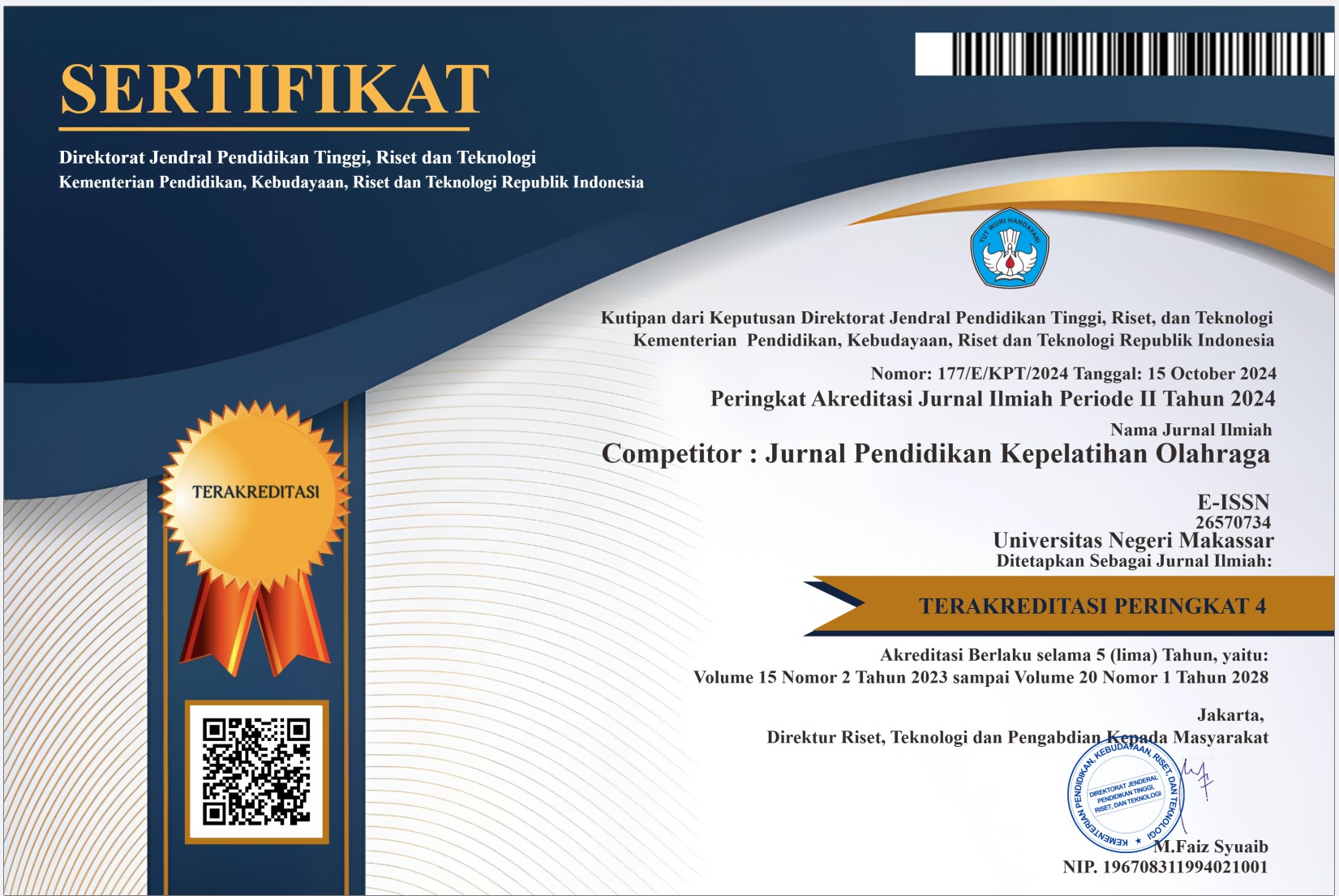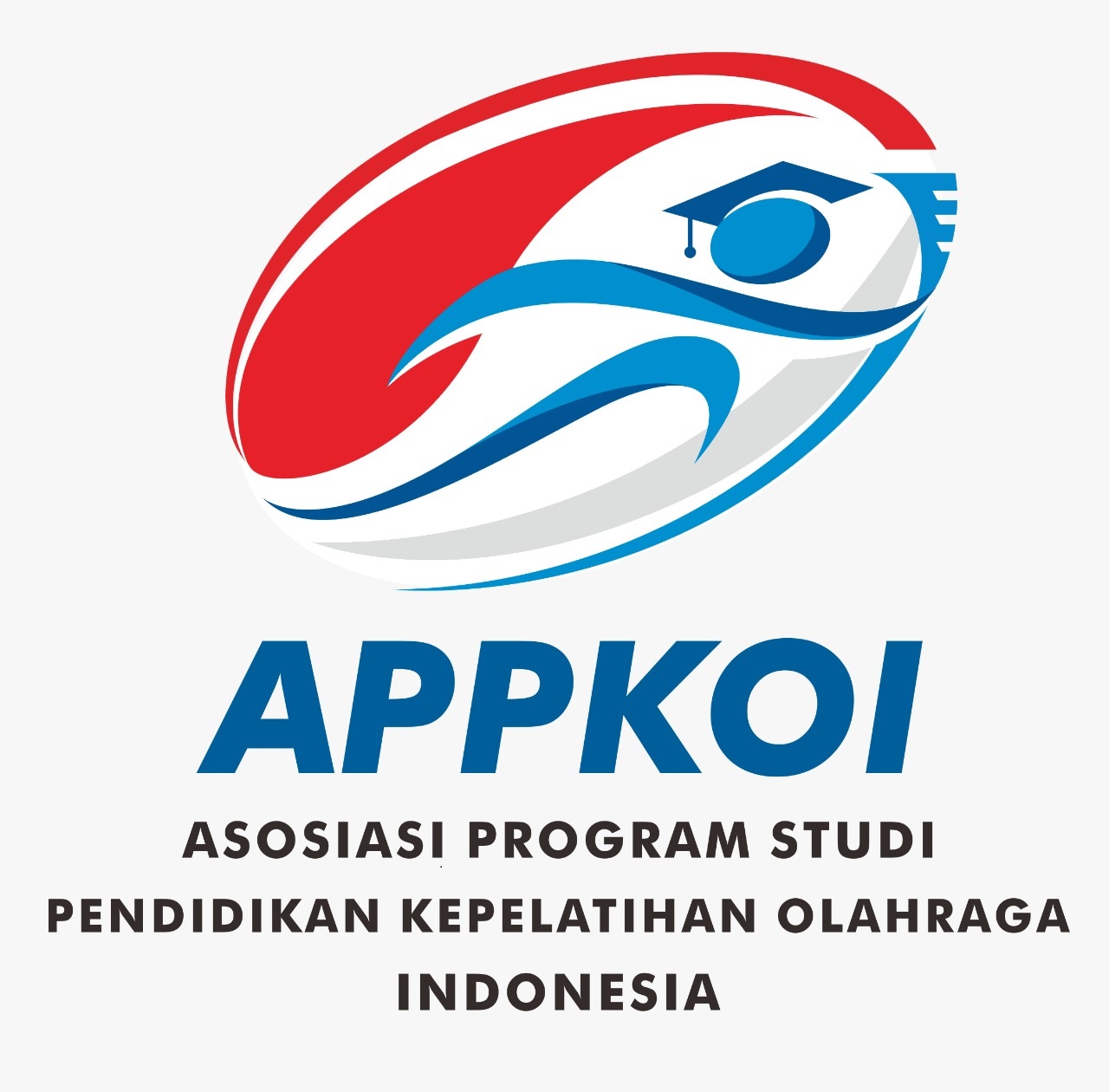Review Of Equestrian Training (Equestrian Sports) On Athlete Concentration At Club Stable, Bahar Peat District
DOI:
https://doi.org/10.26858/cjpko.v17i2.73391Keywords:
Equestrian Training, Concentration, Cognitive Performance, Horse Riding, Athlete Development.Abstract
This study examines the impact of equestrian training on the concentration levels of athletes at Club Stable Bahar, located in the Peat District. Recognising the unique cognitive demands of equestrian sports, this research investigates how structured training contributes to riders' mental focus and attentional capacity. The study employed a quantitative descriptive method, utilising observation techniques and validated questionnaires to collect data on athlete concentration levels. Six athletes from the club participated as respondents. The analysis categorised concentration levels into three groups: high, medium, and low. The results revealed that none of the athletes (0%) were in the high-concentration category, five athletes (83%) were in the medium category, and one athlete (17%) was categorised as having low concentration. These findings suggest that while equestrian training at Club Stable Bahar provides some cognitive stimulation, it may not be sufficiently structured to develop high-level concentration skills in most athletes. In conclusion, the overall concentration level of athletes engaged in equestrian training at Club Stable Bahar falls within the medium category. This highlights the need for the integration of targeted psychological skills training—particularly focused attention and mental conditioning—into the existing equestrian training programs. Enhancing these aspects may not only improve rider concentration but also positively influence overall performance and safety in equestrian sports. Further research with a larger sample size is recommended to validate these findings and develop evidence-based training models for cognitive skill development in grassroots equestrian settings.
References
Alfreado, W. A., Subagya, K., & Kurniasih, S. (2024). The Design Of An Equestrian Training Arena In The City Of Parung, Bogor, With The Application Of American Classic Architecture. In Jurnal Arsitron (Vol. 9, Issue 1).
Anggraini, D., Khumaerah, N., & Aswar. (2021). The Effect of Emotion Regulation on Prematch Anxiety of Taekwondo UKM Athletes in Makassar City. Psyche 165 Journal, 336–341. https://doi.org/10.35134/jpsy165.v14i4.134
Aziz, D. (2023). Implementation of Archery Sports in the Formation of Children's Religious Character Based on Islamic Education (Case Study of Children Aged 6-12 Years at Master Archery Club Pangkalpinang). LENTERNAL: Learning and Teaching Journal, 4(1), 49–57. https://doi.org/10.32923/lenternal.v4i1.2881
Barlow, M., et al. (2018). Rider experience and horse behaviour during equestrian activities. Journal of Equine Veterinary Science, 69, 10–16. https://doi.org/10.1016/j.jevs.2018.06.009
Birrer, D., & Morgan, G. (2010). Psychological skills training is a way to enhance an athlete’s performance. Scandinavian Journal of Medicine & Science in Sports, 20(2), 78–87. https://doi.org/10.1111/j.1600-0838.2010.01194.x
Binsch, O., et al. (2017). Attention and motor control in sports. Psychology of Sport and Exercise, 28, 90–96. https://doi.org/10.1016/j.psychsport.2016.10.003
Devienne, M. F., & Guezennec, C. Y. (2019). Physical and mental demands in equestrian sports. European Journal of Applied Physiology, 86(4), 402–406.
Fitriani, R., et al. (2020). Localized athlete development in equestrian sport. Jurnal Olahraga dan Kesehatan, 9(3), 45–52.
Guillot, A., et al. (2019). Mental imagery and concentration in motor learning. Neuroscience & Biobehavioral Reviews, 105, 68–75.
Gustian, U. (2016). The importance of attention and concentration in supporting athletes' performance. Journal of Sports Performance, 1(01), 89-102.
Hale, B. D., & White, A. (2020). The psychology of sports performance. Routledge.
Hidayat, R., et al. (2021). Psychological readiness and performance in Indonesian athletes. Jurnal Keolahragaan, 9(1), 55–62.
Khoirul Nisa, M. J. (2021). The Effect Of Confidence On The Mental Toughness Of Martial Arts Athletes Khoirul Nisa Miftakhul Jannah.
Koca, T. T., & Ataseven, H. (2015). Effects of horse riding therapy on psychological well-being. Journal of Back and Musculoskeletal Rehabilitation, 28(4), 749–754. https://doi.org/10.3233/BMR-140590
Kristiana, R., & Sunandar, A. (2020). Identification of risks in the operational phase and maintenance of the Equestrian Stadium project, Jakarta, based on a public-private partnership approach. In Foundation Journal (Vol. 9).
Lee, C. Y., et al. (2022). Cognitive outcomes of horseback riding in children. Human Movement Science, 81, 102919.
Limond, J. A., et al. (2014). Horseback riding and neurocognitive development. Therapeutic Advances in Psychopharmacology, 4(5), 231–239.
MacNamara, Á., et al. (2016). Psychological characteristics of developing excellence. Journal of Sports Sciences, 34(13), 1192–1201.
Micklewright, D., et al. (2017). The psychobiological model and sports performance. Current Sports Medicine Reports, 16(4), 278–282.
Moran, A. (2012). Sport and exercise psychology: A critical introduction. Routledge.
Nassif, C., et al. (2020). Performance metrics in equestrian training. Journal of Sports Sciences, 38(15), 1720–1728.
Neumayr, G., et al. (2017). Physiological demands of equestrian sports. International Journal of Sports Physiology and Performance, 12(4), 512–517.
Purnomo, E., Marheni, E., & Jermaina, N. (2020). Confidence Level Of Adolescent Athletes. JOSEPHA: Journal of Sport Science And Physical Education, 1(2), 1–7. https://doi.org/10.38114/josepha.v1i2.86
Puspitasari, F. (2023). Design Of Malang Equestrian School With A Metaphorical Architectural Approach.
Putri, S., et al. (2022). Challenges in youth equestrian training in Indonesia. Jurnal Pendidikan Jasmani Indonesia, 3(2), 91–97.
Raibowo, S., Wulandari, I., Prabowo, A., Permadi, A., & Barnanda Rizky, O. (2023). Anxiety And Concentration In Pomnas XVII West Sumatra 2022 Field Tennis Athletes. Journal of Physical Health and Sports, 8(1), 1–8. https://doi.org/10.36526/kejaora.v8i1.2418
Santangelo, S., et al. (2021). Cognitive development and athletic training in adolescence. Developmental Cognitive Neuroscience, 49, 100971.
Sari, M., Rachman, H., Juli Astuti, N., Win Afghani, M., & Abdullah Siroj, R. (2022). Explanatory Survey in Quantitative Descriptive Research Methods. Journal of Science and Computer Education, 3(01), 10–16. https://doi.org/10.47709/jpsk.v3i01.1953
Schmidt, A., et al. (2018). Cognitive load in equestrian performance. Frontiers in Psychology, 9, 565. https://doi.org/10.3389/fpsyg.2018.00565
Taufik, M. S. (2019). The Relationship between Concentration Level and Futsal Playing Skills: Futsal Student Activity Unit of Suryakancana University. Rehearsal: Journal of Sports Science, 10(02), 68–78. https://doi.org/10.21009/GJIK.102.01
Tickle, L., et al. (2021). Psychological and biomechanical benefits of horse riding. PLoS ONE, 16(2), e0247592.
Wolfram, I., & Micklewright, D. (2016). Pre-competitive anxiety and equestrian performance. Comparative Exercise Physiology, 12(2), 89–96.
Downloads
Published
Issue
Section
License
Copyright (c) 2025 Tiara Anggreani Nahan, Edwin Wahyu Dirgantoro, Nurdiansyah Nurdiansyah (Author)

This work is licensed under a Creative Commons Attribution 4.0 International License.



















